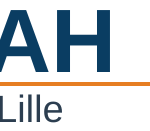Le LIP publie un papier dans les actes de la conférence OCCE 23 qui s’est déroulée en août 2023 à Hiroshima au Japon. Ce papier revisite les données collectées dans le cadre des expérimentations menées sur le jeu Tamagocours.
Abstract :
This paper draws on an empirical work dedicated to assessing the relevance of an online training course for pre-service teachers. The course is dedicated to the legal rules governing the use of digital educational resources. It consists of a game-based learning session with Tamagocours, an online Multiplayer Tamagotchi. The players take care of a character by feeding it with “digital educational resources”. If the choice of resources does not respect copyright legislation, the character withers and eventually dies. Based on the digital traces collected from 242 players, we conducted a factor analysis to classify the players according to the interactions that took place during the game session. Our analysis shows that the game is played in very different ways depending on the teams. It also provides evidence that the interactions that take place are not always epistemic interactions and that some players use avoidance strategies that work against learning. Our contribution therefore focuses on a method for understanding how a game is played and the potential effects of playing on learning. In addition, these results may offer new perspectives for the design of learning games. Indeed, the result of the study emphasize the need to focus on the player’s learning experience in terms of epistemic interactions.
Sanchez, E., & Mandran, N. (2023). Tracking Epistemic Interactions from Online Game-Based Learning. In T. Keane, C. Lewin, T. Brinda, & R. Bottino (Éds.), Towards a Collaborative Society Through Creative Learning (p. 298‑308). Springer Nature Switzerland. https://doi.org/10.1007/978-3-031-43393-1_27



